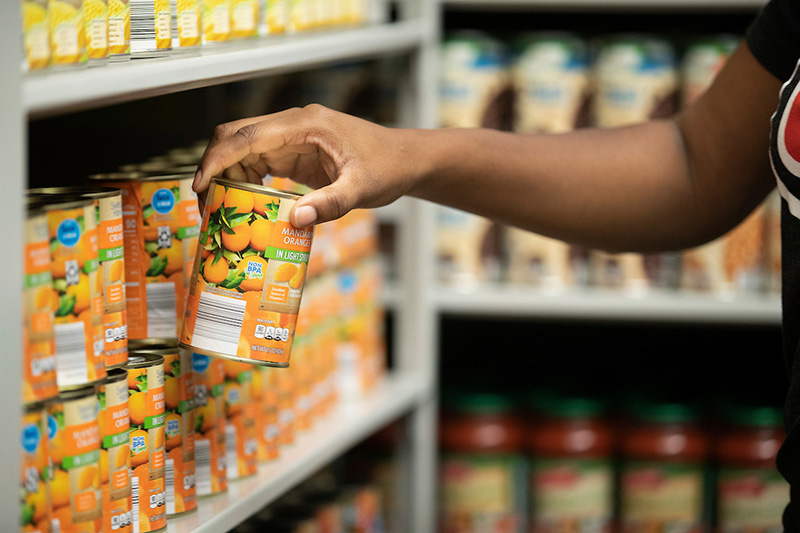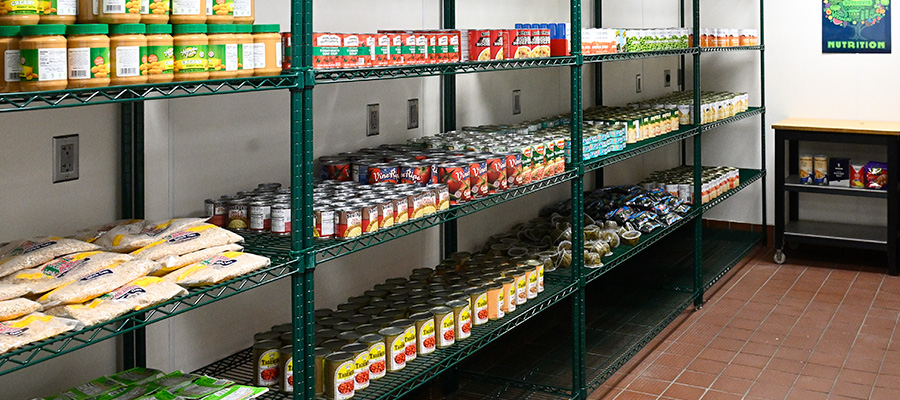Why Supporting Your Regional Food Cupboard Is Vital for Aiding Those in Requirement
The significance of supporting local food kitchens can not be overemphasized, specifically in the context of food instability, which affects a startling number of people and families within our areas. As we check out the multifaceted role of food cupboards, it ends up being obvious that their influence expands much past merely distributing food.
Comprehending Food Insecurity
Food insecurity influences around 10.5% of families in the United States, showing a significant public health issue that transcends simple appetite. It describes the absence of regular accessibility to enough food for an energetic, healthy life. This condition can lead to a variety of negative results, consisting of inadequate health and wellness, enhanced health care prices, and lessened scholastic performance among youngsters.
The root causes of food insecurity are multifaceted, often coming from financial elements such as hardship, joblessness, and underemployment. Geographical location can also play an essential duty, with food deserts-- locations with minimal accessibility to affordable and nutritious food-- aggravating the problem - Food Pantry Lockhart. Furthermore, systemic aspects, consisting of social and racial inequities, contribute to the out of proportion influence of food insecurity on marginalized neighborhoods
Resolving food insecurity is not simply about enhancing food supply; it calls for a detailed approach that incorporates financial stability, education, and neighborhood support. Food instability not only affects private well-being but additionally has more comprehensive ramifications for societal health and wellness and performance. Recognizing its complexity is important for creating effective interventions and cultivating long-lasting services that make certain all people have reliable access to healthy food.
The Function of Food Pantries
Local food cupboards act as critical lifelines for individuals and families dealing with food insecurity. They give essential food items to those that might battle to manage adequate nourishment because of economic challenge, joblessness, or unexpected situations. By dispersing food at no charge, these companies help alleviate cravings and protect against the unfavorable wellness effects related to inadequate diet regimens.
Food cupboards frequently partner with regional farms, food store, and area companies to source a selection of nourishing food things, including fresh produce, milk, and proteins. This collaboration ensures that kitchen customers get not only food yet likewise healthier alternatives that add to total well-being.
Furthermore, food pantries work as neighborhood centers, cultivating connections amongst residents and providing a feeling of dignity to those in demand. Many kitchens supply additional resources, such as nourishment education and recommendations to social services, aiding customers navigate their obstacles extra properly.
In essence, food pantries play a complex role in combating food insecurity. They not only address immediate cravings however also empower families and people to enhance their situations, thereby advertising community resilience and cohesion.

Advantages of Supporting Food Pantries

Sustaining food cupboards not only nourishes those in need but likewise enhances the material of the neighborhood. By offering important food resources, food kitchens alleviate appetite and decrease food insecurity, which is essential for the health and wellness of individuals and households. Accessibility to nutritious food adds to enhanced physical wellness, far better instructional results for children, and enhanced mental wellness, consequently promoting a more productive and involved neighborhood.
Moreover, sustaining food kitchens advertises social communication. These organizations work as hubs for community involvement, combining volunteers, donors, and receivers in a shared objective to deal with appetite. This partnership can break down barriers, foster understanding, and build partnerships amongst varied community members.
In addition, donations to food kitchens, whether in the kind of food, funds, or time, boost the local economic climate. Several food kitchens focus on sourcing from regional producers, hence supporting local farming and companies. This develops a cycle of assistance that benefits not only those in demand but the neighborhood in its entirety.
How to Obtain Included
Interaction you can find out more with food kitchens can take lots of kinds, allowing people and teams to make a meaningful impact in their neighborhoods. One of one of the most straight ways to get included is by donating food products. Non-perishable products such as canned goods, pasta, and rice are constantly in need. Monetary donations are likewise vital, as they allow food kitchens to buy fresh fruit and vegetables and essential materials.
Volunteering your time is another impactful method to sustain regional food pantries. Lots of organizations count on volunteers for arranging, packing, and distributing food. This hands-on participation not only assists the kitchen however also promotes a sense of community. In enhancement, consider organizing food drives within your area, office, or institution team to elevate understanding and collect resources.
Partnerships with regional organizations can additionally boost support for food kitchens. By taking these groups, actions and individuals can dramatically reinforce the initiatives of neighborhood food pantries and assist those in need.
Neighborhood Influence and Connection
Recognizing the profound impact of food kitchens on community wellness is essential for fostering a spirit of link and partnership. Food pantries serve not just as important sources for those encountering food insecurity yet also as centers for community interaction. They bring together varied teams-- donors, clients, and volunteers-- developing top article an atmosphere where people can sustain and connect one another.
The impact of food kitchens prolongs past mere provision of food; they function as a catalyst for social cohesion. By participating in kitchen initiatives, neighborhood members can develop connections that go beyond socioeconomic barriers. This network of support assists to take down the preconception commonly related to food support, cultivating an environment of approval and understanding.
Furthermore, food pantries typically collaborate with local companies, colleges, and organizations, magnifying their reach and efficiency. These collaborations boost neighborhood resilience and encourage a cumulative response to food insecurity. As individuals unite in their initiatives to sustain regional food cupboards, they cultivate a sense of official statement shared function and obligation, strengthening the idea that everybody has a role to play in making certain that no one goes starving. Eventually, sustaining food pantries enhances the material of the community in its entirety.
Conclusion
Sustaining neighborhood food kitchens is essential in combating food instability and enhancing the health of at risk populaces. By making certain access to nourishing food, these organizations add to improved health and wellness outcomes, educational performance, and psychological health and wellness. Interaction with food pantries promotes neighborhood links, promoting social communication and equity. Ultimately, the cumulative effort to boost these crucial sources plays a considerable function in building a much healthier, a lot more resilient culture where all individuals have the possibility to flourish.
